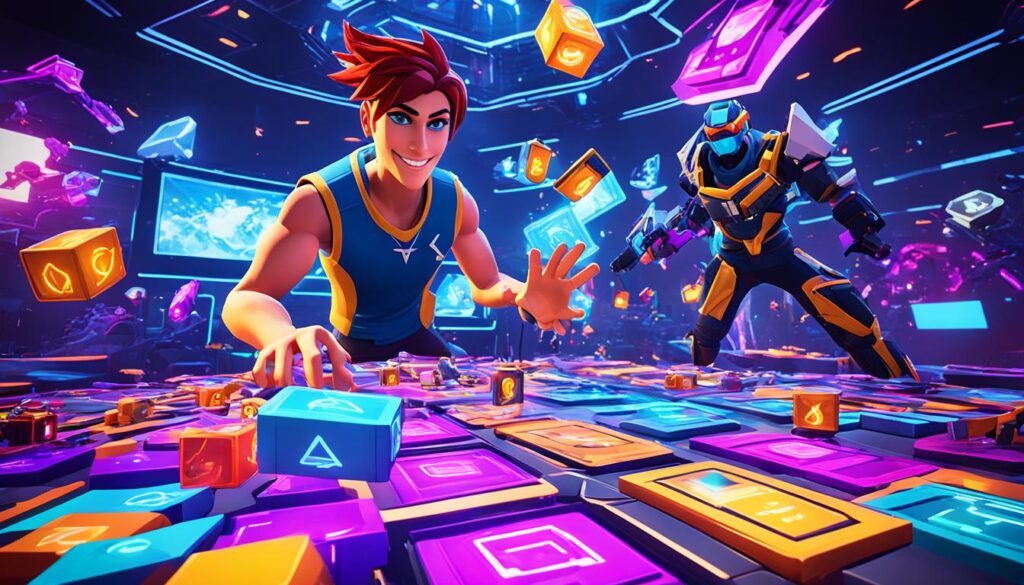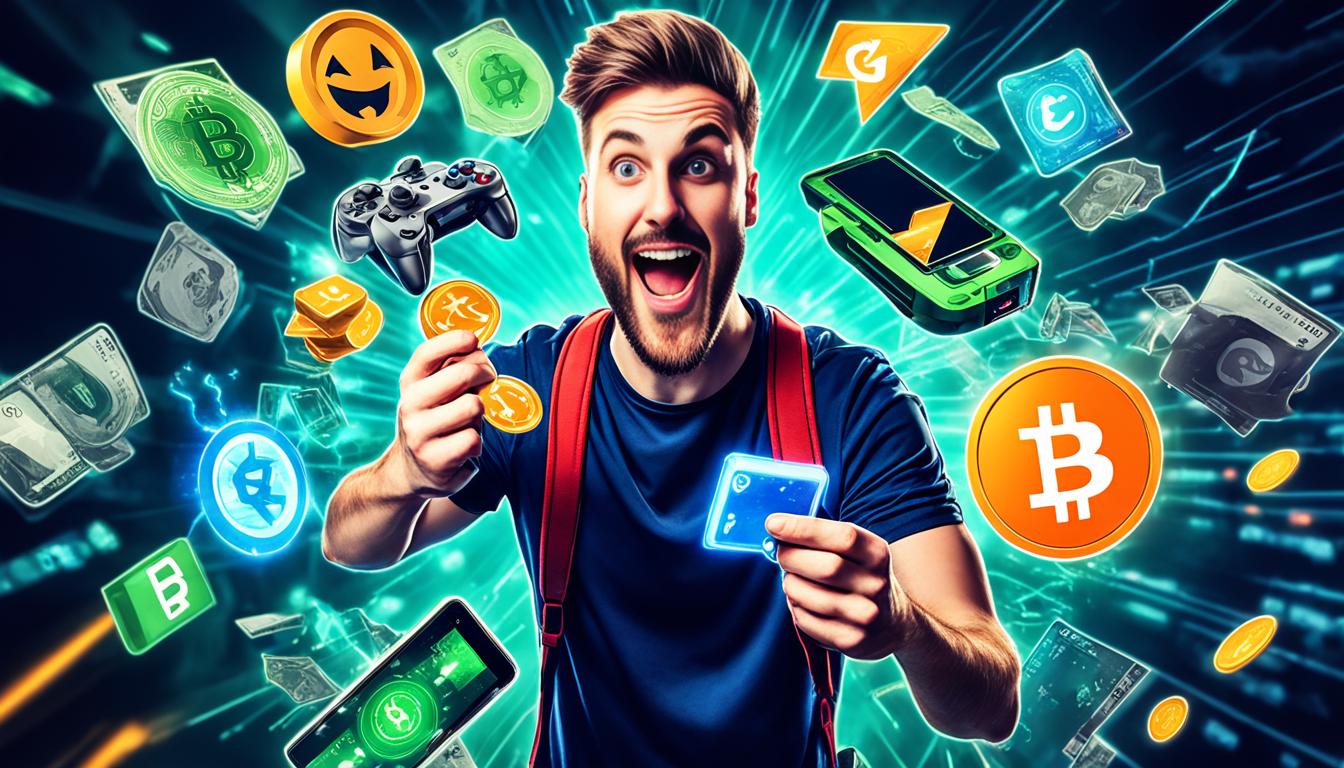Did you know that the integration of cryptocurrency in video games is reshaping the future of online entertainment in Nigeria? This unexpected fusion between gaming communities and cryptocurrencies is taking the gaming experience to new heights and creating exciting opportunities for players.
The use of cryptocurrencies in video games allows for in-game purchases, rewards and loyalty programs, and the utilization of blockchain technology for item ownership and trading. This integration not only enhances player engagement but also provides faster and more secure transactions for players in Nigeria and beyond.
Key Takeaways:
- Cryptocurrency integration in video games enables players to make in-game purchases using cryptocurrencies, simplifying cross-border transactions and fostering inclusivity.
- The use of blockchain technology revolutionizes item ownership and trading, providing players with true ownership of their virtual assets.
- The tokenization of in-game assets through non-fungible tokens (NFTs) allows players to monetize their possessions and participate in virtual economies.
- Decentralized gaming platforms offer transparency, player ownership, and governance, empowering players and shaping the future of online gaming.
- The future of cryptocurrency and gaming communities holds the potential for more immersive virtual worlds and increased player engagement.
Cryptocurrency Integration in Video Games
The integration of cryptocurrency in video games is transforming the way players engage with virtual worlds. This groundbreaking integration enables players to make in-game purchases using cryptocurrencies, providing a faster and more secure method to acquire virtual items, currency, and other assets.
By embracing cryptocurrency, video game developers are simplifying cross-border transactions, promoting inclusivity among players from different regions. This opens up a world of opportunities, allowing gamers around the globe to connect and enjoy immersive gaming experiences.
Cryptocurrencies are not only changing how players make purchases but also revolutionizing rewards and loyalty programs within games. By incorporating blockchain technology, game developers can create unique rewards and loyalty systems built on decentralized networks. This incentivizes players for their in-game activities and fosters a valuable in-game ecosystem.
Moreover, blockchain technology introduces a paradigm shift in item ownership and trading. Through the use of non-fungible tokens (NFTs), players can finally have true ownership of their virtual assets. NFTs represent unique and provably scarce digital assets, ensuring authenticity and enabling players to trade and monetize their in-game possessions.
“The integration of cryptocurrencies in video games offers players a faster, more secure way to acquire virtual items, while also transforming the rewards and loyalty experience. Blockchain technology revolutionizes item ownership and trading through NFTs, empowering players with true asset ownership.”
This integration of cryptocurrency and blockchain technology not only enhances the gaming experience but also presents new avenues for players to engage and monetize their in-game assets. It fosters a sense of ownership and value, allowing gamers to fully immerse themselves in the virtual worlds they love.
Now, let’s dive deeper into the tokenization of in-game assets and how it impacts player experiences and opportunities for monetization.
Tokenization of In-Game Assets
The integration of non-fungible tokens (NFTs) has revolutionized the cryptocurrency landscape in the gaming industry. NFTs provide a unique opportunity for players to tokenize their in-game assets, granting them true ownership and control over their virtual possessions.
The Power of Non-Fungible Tokens
Unlike traditional cryptocurrencies, which are fungible and interchangeable, NFTs represent one-of-a-kind digital assets. This uniqueness allows players to tokenize their rare or special in-game items, such as exclusive skins, weapons, or collectibles. By attaching these assets to NFTs, players gain the ability to buy, sell, and trade them on secondary markets, unlocking new monetization opportunities.
The tokenization of in-game assets through NFTs has created a paradigm shift where virtual items hold real-world value. Players can leverage their gaming skills and investments to generate income and participate in the emerging virtual economies.
Monetization Opportunities
With the tokenization of in-game assets, players can explore various monetization opportunities within the gaming ecosystem.
- Secondary Markets: By tokenizing in-game assets, players can sell their virtual possessions to other players or collectors on secondary markets. These transactions provide a platform for individuals to profit from their gaming achievements.
- Collectibles and Limited Editions: NFTs enable the creation of limited edition in-game items and collectibles. Players can mint unique NFTs representing these exclusive assets, making them highly desirable and sought after by collectors.
- Participation in Virtual Economies: The tokenization of in-game assets facilitates the emergence of player-driven economies. Players can actively participate in shaping the economic landscape, creating value, and driving the growth of virtual economies.
Unlocking True Ownership
The tokenization of in-game assets using NFTs empowers players with true ownership and control. Through blockchain technology, players can prove the authenticity and rarity of their virtual possessions, eliminating the risk of fraud or duplication. This shift towards true ownership enhances player experiences and adds value to their gaming investments.
Players can take pride in their in-game achievements and possessions, knowing that they hold unique digital assets with real-world value. This sense of ownership fosters a deeper engagement with the gaming community and contributes to the overall growth of the industry.

As the tokenization of in-game assets continues to gain traction, players can expect even more exciting opportunities to monetize their virtual possessions and participate in player-driven economies. The future of gaming holds the promise of empowerment, ownership, and new horizons for players everywhere.
Decentralized Gaming Platforms
Decentralized gaming platforms are revolutionizing the gaming industry, bringing transparency, player ownership, and governance to the forefront of the gaming ecosystem. These platforms leverage blockchain technology to create secure and transparent gaming environments that are owned and controlled by the players themselves. By shifting power from centralized entities to the community, decentralized gaming platforms ensure that players have true ownership of their in-game assets and a voice in platform operations through decentralized autonomous organizations (DAOs) or other community-driven systems.
One of the key advantages of decentralized gaming platforms is the transparency they offer. Powered by blockchain, these platforms enable a fair and trusted gaming experience by providing an immutable record of transactions and in-game activities. This transparency not only enhances player trust but also acts as a deterrent against cheating and fraud, creating a level playing field for all participants.
Furthermore, decentralized gaming platforms empower players to monetize their in-game assets and participate in virtual economies. By granting players true ownership of their digital possessions, these platforms enable players to freely trade, sell, or showcase their assets within the ecosystem. This opens up new avenues for players to earn income from their gaming activities, creating a more inclusive and rewarding gaming experience.
As decentralized gaming platforms continue to evolve, the future holds the promise of more immersive virtual worlds, increased adoption, and greater player engagement. By embracing transparency, player ownership, and governance, these platforms are transforming the gaming landscape, putting the power back into the hands of the players and shaping the future of gaming.
FAQ
How is the intersection of cryptocurrency and gaming communities reshaping the future of online entertainment in Nigeria?
What can players do with cryptocurrency integration in video games?
What is the significance of tokenization of in-game assets?
How are decentralized gaming platforms reshaping the gaming industry?
Source Links
- https://www.financemagnates.com/cryptocurrency/innovation/crypto-gaming-the-fusion-of-cryptocurrencies-and-the-gaming-industry/
- https://medium.com/blockchain-smart-solutions/the-impact-of-cryptocurrency-on-the-gaming-industry-7c1a3cda6c73
- https://blockchainmagazine.net/your-quick-read-to-the-relationship-between-metaverse-gaming-and-cryptocurrency/

Leave a Reply